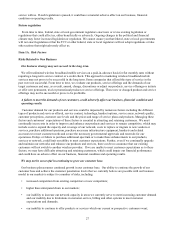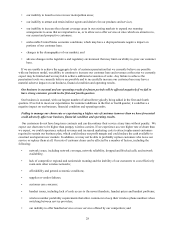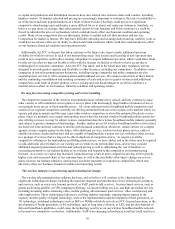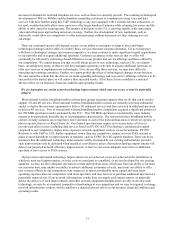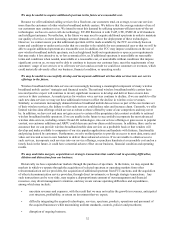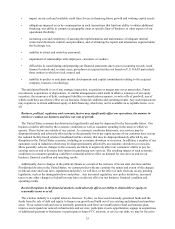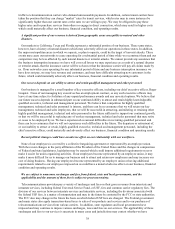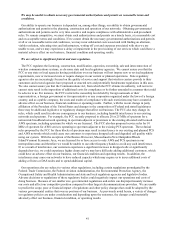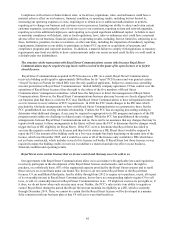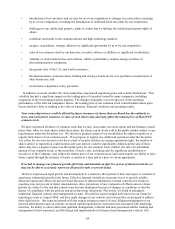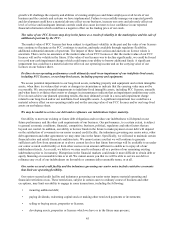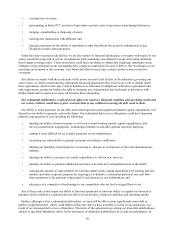Metro PCS 2008 Annual Report Download - page 46
Download and view the complete annual report
Please find page 46 of the 2008 Metro PCS annual report below. You can navigate through the pages in the report by either clicking on the pages listed below, or by using the keyword search tool below to find specific information within the annual report.37
limited number of DAS system providers. Some of the DAS system providers we are using have not previously
constructed or been authorized to construct DAS systems in certain of our new metropolitan areas so there may be
unforeseen obstacles and delays in constructing the DAS systems in those metropolitan areas. In addition, the
authorization of the DAS provider to construct DAS systems may be subject to challenge and injunctive relief,
resulting in delay and material costs in providing alternative coverage in the affected metropolitan areas. In
addition, DAS systems also pose particular compliance challenges with regard to any backup power requirements
that may be adopted by the FCC, which, if adopted could have a material adverse effect on our ability to comply
with applicable laws, could require us to spend significant amounts of additional capital, and could have a material
adverse effect on our business, financial condition and operating results.
We may be unable to obtain the roaming and other services we need from other carriers at rates that allow us
to remain competitive or at all.
Many of our competitors have more extensive regional or national networks which enable them to offer automatic
roaming and long distance telephone services to their subscribers at a lower cost than we can offer and allow them to
offer unlimited fixed-rate local, regional, and nationwide roaming plans on their existing networks over a larger area
than we can offer. We do not have as extensive a network as the national wireless broadband mobile carriers, and we
must pay fees to other carriers who provide roaming services and who carry long distance calls made by our
subscribers. We currently have roaming agreements with several other carriers which allow our customers to roam
on those carriers’ network. The roaming agreements, however, do not cover all geographic areas where our
customers may seek service when they travel, they generally cover voice but not data services, and some of these
agreements may be terminated on relatively short notice. As the wireless industry has consolidated, and may
continue to consolidate in the future, we may have increased difficulty entering into new roaming agreements with
other technically compatible carriers or replacing our existing roaming agreements. In addition, we believe the rates
we are charged by certain carriers in some instances are higher than the rates they charge to other roaming partners.
Further, many of the wireless carriers against whom we compete have service area footprints substantially larger
than our footprint.
Our ability to replicate these roaming service offerings at rates which will make us, or allow us to be, competitive
is uncertain at this time. The FCC recently clarified that CMRS providers must offer automatic roaming services on
just, reasonable and non-discriminatory terms, but found that a CMRS provider is not required to offer roaming
services in any geographic area for which a requesting carrier holds a license or other spectrum usage rights, even if
the requesting carrier has not yet built its system. The FCC also has not extended full roaming rights to roaming
services that are classified as information services (such as high speed wireless Internet access services), or for
roaming services that are not classified as CMRS (such as non-interconnected services). If we are unable to enter
into or maintain roaming agreements for roaming services that our customers want at reasonable rates, including in
areas where we have licenses or lease spectrum but have not constructed facilities, we may be unable to compete
effectively and attract and retain customers, and we may lose revenues. We also may be unable to continue to
receive roaming services in areas in which we hold licenses or lease spectrum after the expiration or termination of
our existing roaming agreements. We also may be obligated to allow customers of other technically compatible
carriers to roam automatically on our systems, which may enhance their ability to compete with us. If these risks
occur, it may have a material adverse effect on our business, financial condition and operating results.
We may incur higher than anticipated intercarrier compensation costs.
When our customers use our service to call customers of other carriers, in certain circumstances we are required to
pay the carrier that serves the called party, and any intermediary or transit carrier, for the use of their networks. An
ongoing FCC rulemaking proceeding is examining whether a unified intercarrier compensation regime should be
established for all traffic exchanged between all carriers, including CMRS carriers such as us. New intercarrier
compensation rules, if adopted, may result in increases in the charges we are required to pay other carriers for
terminating calls on their networks, increase the costs of or difficulty in negotiating new agreements with carriers,
and decrease the amount of revenue we receive for terminating calls from other carriers on our network. Any such
changes may have a materially adverse effect on our business, financial condition and operating results.
Some carriers who terminate calls originated by our customers have sought, and others may seek, to impose
termination charges on us that we consider to be unreasonably high and have threatened to pursue, or have initiated
or may initiate, claims against us to recover these charges. The outcome of these claims is uncertain. A
determination that we are liable for additional terminating compensation payments could subject us to additional
claims by other carriers. Further, legal and business considerations may inhibit our ability or willingness to block


